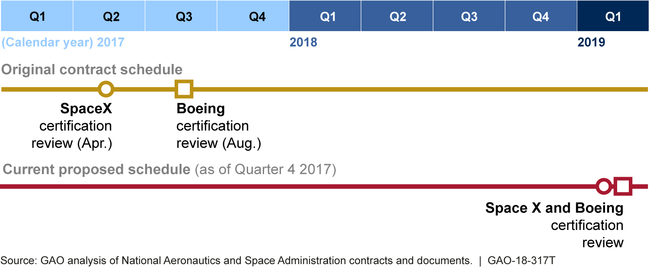NASA Commercial Crew Program: Continued Delays Pose Risks for Uninterrupted Access to the International Space Station
Fast Facts
Boeing and SpaceX, the companies NASA contracted with to develop and produce vehicles to transport astronauts to the International Space Station, have set aggressive schedules and experienced continually shifting dates.
In this testimony, we noted that while both contractors have made progress developing their vehicles, both have also experienced delays. With safety and programmatic risks to address, further delays are likely. This could ultimately jeopardize the U.S.'s uninterrupted access to the space station and may lessen NASA’s return on investment with the contractors.
Boeing and SpaceX Crew Transportation Systems

Artist rendering of Boeing and SpaceX Crew Transportation Systems
Highlights
What GAO Found
Both Boeing and Space Exploration Technologies (SpaceX) are making progress toward their goal of being able to transport American astronauts to and from the International Space Station (ISS). However, both continue to experience schedule delays. Such delays could jeopardize the ability of the National Aeronautics and Space Administration's (NASA) Commercial Crew Program to certify either company's option—that is, to ensure that either option meets NASA standards for human spaceflight—before the seats the agency has contracted for on Russia's Soyuz spacecraft run out in 2019. (See figure.)
Commercial Crew Program: SpaceX and Boeing's Certification Delays

GAO's ongoing work has identified three key risks, which are consistent with challenges reported in February 2017 that could further delay certification of each contractor's crew transportation system:
- Aggressive schedules —NASA, Boeing, SpaceX, and independent review bodies have all noted that the contractors' schedule plans are aggressive. The anticipated schedule risks have since materialized.
- Programmatic and safety risks —SpaceX and Boeing are addressing technical risks, which is not uncommon for NASA projects as they often push the state of the art in space technology. In addition, the contractors' systems must meet a standard for crew safety. Additional work remains to determine whether the contractors will meet this requirement.
- Program office workload —Program officials told GAO that one of their greatest upcoming challenges will be to complete two oversight activities—conducting phased safety reviews and verifying that contractors meet requirements—concurrently. The program's ability to smooth its workload is limited, as the contractors generally control their development schedules. In February 2017, GAO found that proposed schedule changes could alleviate some overlap.
Delays and uncertain final certification dates raise questions about whether the United States will have uninterrupted access to the ISS after 2019, and may lessen NASA's return on investment with the contractors. GAO will continue to assess the contractors' and program's progress.
Why GAO Did This Study
Since the Space Shuttle was retired in 2011, the United States has been relying on Russia to carry astronauts to and from the space station. NASA's Commercial Crew Program is facilitating private development of a domestic system to meet that need safely, reliably, and cost-effectively before the seats it has contracted for on a Russian spacecraft run out in 2019.
In 2014, NASA awarded two firm-fixed-price contracts to Boeing and SpaceX worth a combined total of up to $6.8 billion to develop crew transportation systems and conduct initial missions to the space station. In February 2017, GAO found that both contractors had made progress, but their schedules were under mounting pressure.
This statement provides preliminary observations on the extent to which the contractors and the program are making progress toward meeting NASA's standards for human spaceflight, a process called certification.
This statement is based on ongoing work and information contained in GAO's February 2017 report on this program (GAO-17-137). To do this work, GAO analyzed contracts, schedules, and other documentation.
Recommendations
GAO is not making any new recommendations. In February 2017, GAO recommended that NASA develop a contingency plan to maintain access to the ISS beyond 2018, when its contract with Russia for seats on the Soyuz was scheduled to end. NASA agreed with this recommendation and purchased Soyuz seats through 2019.
